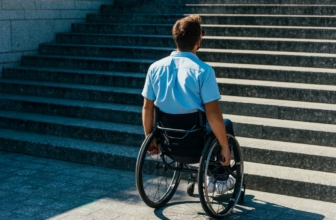If you have epilepsy and fear having a seizure in public, this guide will help you overcome anxiety and go outside with confidence.
Epilepsy is a disorder of the brain characterized by repeated seizures. It can be caused by different diseases that affect a person’s brain, such as a central nervous system infection, stroke, head injury or brain tumor. According to the Centers for Disease Control and Prevention, in 2015, 1.2% of the U.S. population (about 3.4 million Americans), had active epilepsy.
A recent study showed that phobic and agoraphobic symptoms (fear of being in a public place or in a situation that might cause panic or embarrassment) are common and associated with poor quality of life in people with epilepsy. Agoraphobia can lead to delays in patient care because of a reluctance of people living with epilepsy to go out in public, including going for appointments with health care providers. It can also cause poor quality of life.
But why do people living with epilepsy fear going out?
This article contains affiliate links, so we may receive a commission from sales at no added cost to you. As an Amazon associate, we earn from qualifying purchases.
Why People Who Live with Epilepsy Fear Going Out in Public
“They may fear going into public due to the unpredictability of seizures, the potential for stigma or misunderstanding from others, and the fear of being unable to manage a seizure in a public setting,” says Ryan. S. Sultan, M.D., board-certified psychiatrist, Assistant Professor of Clinical Psychiatry in the Department of Psychiatry at Columbia University, and Medical Director of Integrative Psych NYC.
How to Build Confidence and Overcome Fear with Epilepsy
Since it’s very important for people living with epilepsy to go out for treatment, and to socialize so they can enjoy life, what can they do to overcome their fear of going out?
Understanding Your Epilepsy Can Help You
“It is important for people who live with epilepsy to understand their condition and the risks associated with it, as this can help alleviate some of their anxiety,” says Brian Alman, Ph.D., a psychologist and stress care therapist in California, who has over 30 years of experience. “Education and support groups can be beneficial in providing individuals with the information and tools they need to manage their epilepsy, and connect with others who are going through similar experiences,” he adds.
Try a Combination of Therapy and Medication
Dr. Alman recommends a combination of therapy and medication to help people who live with epilepsy overcome their anxiety about going out.
“Therapy can be helpful in identifying the root cause of the fear and anxiety, and developing coping mechanisms to manage it,” says Dr. Alman. “Cognitive-behavioral therapy (CBT) is a commonly used approach for anxiety-related disorders, including phobias,” he adds.
How can CBT help you?
“CBT can help individuals identify and challenge negative thought patterns, develop relaxation techniques, and gradually face their fears through exposure therapy,” says Dr. Alman.
In addition to therapy, medication can also be helpful in managing anxiety symptoms, according to Dr. Alman. “Anti-anxiety medications and antidepressants can help reduce feelings of fear and anxiety, and provide individuals with the support they need to overcome their fears,” he adds.
How to Prepare Mentally to Leave the House and Motivate Yourself as a Person with Epilepsy
How should you prepare yourself to face these fears so you can go out? How can you motivate yourself to go for treatment or to socialize?
According to Dr. Sultan, here are some techniques you can use.
Visualize Success
Imagining yourself successfully navigating public spaces can help build confidence.
Self-Talk
Practice positive self-talk. Use affirmation cards to start your day with encouraging words. Remind yourself of your strengths and ability to handle difficult situations. For example, say to yourself. “I am more than my epilepsy. I have successfully navigated many challenges in my life, and I have the strength to overcome this too.” Remind yourself, “Having epilepsy does not make me weak or incapable. I have the skills and resilience needed to handle difficult situations, including managing my condition in public.”
Another example of positive self-talk is to say, “Fear does not control me. I have faced and managed my seizures before, and I am capable of doing so in any situation.”
Prepare a Seizure Response Plan
Knowing exactly what to do in the event of a seizure can help reduce anxiety. This might include wearing a medical ID and informing friends or coworkers about how to respond.
Techniques You Can Use to Fight Anxiety About Your Epilepsy in Public
To fight anxiety and fear in public, try the following:
Focus on the Present
By concentrating on the task at hand or the environment, rather than on your fears, you can reduce anxiety.
Use Breathing Techniques
Deep, slow breathing can help manage acute anxiety, according to Dr. Sultan. Here are some breathing techniques he recommends for you to try:
Deep Breathing
- Sit or lie down comfortably.
- Take a slow, deep breath in through the nose, allowing the belly to rise.
- Hold for a few seconds, and then slowly exhale through the mouth.
- Repeat this for several minutes.
Box Breathing
This technique involves inhaling, holding the breath, exhaling, and holding the breath again, all for an equal count (usually 4 or 5).
“Box breathing can help to reduce anxiety by slowing the heart rate and promoting calm,” says Dr. Sultan.
Progressive Muscle Relaxation
This technique involves tensing and then releasing each muscle group. Start from the toes and work up to the head. As you release the tension, you should focus on the changes you feel in your body.
Practice Mindfulness
Paying attention to the present moment without judgment can help reduce anxiety.
Here are some practical mindfulness behaviors Dr. Sultan recommends:
Mindful Observation
Engage in mindful observation when you are outside. This could include noticing the details of a tree, a building, or other people. This practice can help you remain in the moment and distract from fears of a potential seizure.
Mindful Listening
This could involve closing your eyes and paying attention to the sounds around you – the chirping of birds, the hum of traffic, the rustling of leaves. This practice of focusing on sounds can help you stay grounded in the present moment.
Mindful Breathing
Focus on your breath, noticing the sensation of air entering and leaving your body. This can help divert your attention from anxiety to the physical presence in the moment.
Carry a Comforting Object
A small object that brings comfort can help you feel grounded.
Reach Out to a Support Person
“Having a trusted person to text or call can provide reassurance,” says Dr. Sultan.
And according to Dr. Alman, “Having a support system of friends, family, or a therapist can provide encouragement and a sense of safety when going out in public.”
Here are other techniques that Dr. Alman recommends:
Distraction
Focusing on something else, such as listening to music or reading a book, can help divert one's attention away from anxiety-provoking thoughts such as worrying about having a seizure.
Desensitization
Gradually exposing oneself to anxiety-provoking situations can help reduce the fear associated with them.
Medication
In some cases, medication prescribed by a doctor can help reduce anxiety and promote a sense of calm.
What You Can Do to Feel Confident While in Public as Someone with Epilepsy
You may experience feelings of low self-esteem when you remember past embarrassing situations in public. How can you deal with those feelings?
Dr. Sultan recommends the following strategies to help you feel bold and confident in public:
Positive Affirmations
Reminding yourself of your strength and resilience can help boost confidence.
Here are three positive affirmations you can try.
- “I am strong and capable. Epilepsy is a part of my life, but it does not define me.”
- “Each day, I am learning more about managing my condition. I am resilient and can adapt to any situation.”
- “I am more than capable of handling my epilepsy in public. I choose to focus on my abilities, not my fears.”
- “I am a courageous and strong individual, and I am not defined by my epilepsy. I am confident in my ability to handle any challenges that come my way.”
Try affirmation cards and affirmation pins for more positive messages to help you get through stressful days with epilepsy.
Maintain Good Posture
“Physical confidence can boost mental confidence,” says Dr. Sultan.
Remember Past Successes
Reflecting on times you have successfully managed difficult situations can boost your self-confidence.
Reframe the Situation
Instead of viewing going out as a threat, try to view it as a challenge or opportunity.
Practice Self-Compassion
Remind yourself that it's OK to be anxious and that everyone has fears.
Dr. Alman recommends that you should try the following:
- Practice good self-care habits, such as getting enough sleep and eating well, to reduce the risk of having a seizure.
- Wear a medical bracelet or necklace to identify you as having epilepsy.
- Carry emergency medication with you in case of a seizure.
- Focus on the present moment and enjoy the experience of being out in public.
Takeaway
It's completely understandable to feel anxious about going out in public when living with epilepsy. However, remember that you are more than your epilepsy. “You have the strength and the ability to navigate the world, even with this condition,” says Dr. Sultan. “Use the strategies above to manage your fear, but also reach out to professionals for help if you need it. You're not alone in this, and there are people and resources available to support you,” he adds.
“Ultimately, overcoming fear and anxiety related to epilepsy is a process that requires time, patience, and support,” says Dr. Alman. “With the right combination of therapy, medication, and education, individuals with epilepsy can learn to manage their fears and live their lives to the fullest,” he adds.
What do you think? Have you tried any of these tactics before? Do you think you’ll find it easier to go out into public after reading this article? Please share your thoughts in the comments.
Image via Deposit Photos
Isaac Nunoofio is a freelance health, wellness, fitness, nutrition, and medical communications writer and copywriter for hire. He has over 10 years of experience writing health, wellness, fitness, nutrition and healthcare articles. He is a Google-certified digital marketer, Content Marketing Institute-certified content marketer, and very knowledgeable about SEO. He helps bloggers, websites, magazines, health professionals, hospitals/clinics, B2C, and B2B healthcare companies and brands to create health content.

















